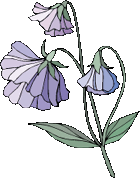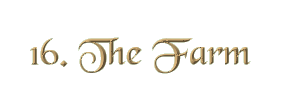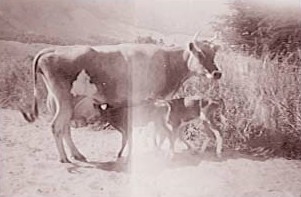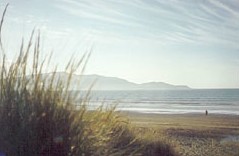











Our new farm at Waikanae was a dairy farm. It was a couple of hundred acres or something and lots of cows, mainly black and white Friesians with a few Jerseys to keep the cream quota up. It was Town Supply - which meant you never got a holiday. The house was near where the Peka Peka Road now is and looked at the tall Waikanae hills topped with a bush that was different from the Ruahines. It had nikau palms. The house had fleas and a lounge painted shocking pink and a gate with the words: Soon the fleas were destroyed, the lounge painted a pale lemon and the sign on the gate covered. Dad added a new lounge and extended the kitchen and put in a new bathroom. But that was later. I jump ahead.  Our House As each new heifer calved for the first time, it would be named. We took turns. Tony was inclined to name them after his old teachers at school, so we had "Mousie" for example. Mousie always had twin calves.  Mousie and Twins  Rick Milking Our house was next to the railway line, and at two in the morning a diesel goods train would roar by. On the first night I woke to a thunderous sound, and jumped from my bed into Sue's. "IT'S THE END OF THE WORLD!" I screamed. "It's a train!" she cried. "IT'S THE END OF THE WORLD!" I soon got used to the trains. In fact, when away from home I'd wake up at the times they should be passing. The previous owners of the farm must have fed the wild ducks because I counted seventy-two mallards once on our lawn. And there were grey teals too - which were different from mallards because they had different colours under the wing. And the yard became littered with ducklings and chickens and bantam mothers that hatched duck eggs and would go crazy when their children jumped in the water. We made silage as well as hay. In the mornings after milking you'd feed out, and cut the stinking silage with a great slicer into blocks. Then you'd come home smelling of twenty thousand rotting raisin-packets and have breakfast. The cows knew when it was milking time. They'd walk down the race in the same order each morning and night, and they'd get milked in the same order. And always, always, there was one that did not come to the shed on its own accord, so you'd walk to the back of the farm just to collect that single, solitary, stubborn cow.  Milking Time "Mum, I'm going to the museum," I would say. And the museum grew until Sue and her husband and children came to live there. For Sue married Allan. But I jump ahead. Dad loved to build. He'd put up a hay shed in a weekend, and the Building Inspector would call and say, "You never got a permit". "For what?" Dad would ask. "For the hay shed," the man would say. "Why would I need a permit?" asked Dad. "Because you need a permit to build," said the man. "But the hay shed's been there for years," said Dad. And the Building Inspector would leave all perplexed and bothered, convinced that his map was wrong and his records were wrong and his plans were wrong, and that the man who had the job before him must have been a complete idiot. And later, like magic, over a weekend an extension would appear on the implement shed. Once Dad decided to build a glass house. The frame was up, and the Building Inspector roared in. "I've caught you! I've caught you in the act!" But it was a glass house, and a glass house, at least in those days, didn't need a permit. Mum gave the man a cup of tea. "Hypocrite!" said Dad to Mum. So we settled in to our new farm in our new place, with or without a permit. In the evenings, after milking, Rick would take us down on the tractor to the beach where we'd swim in the sunset, with sky red and silver and water dark as blood. And Kapiti Island would wade in the sea like a wise, wise giant who had seen a million things in a million years pass by, and was now watching us in this new place.  Kapiti Island from Waikanae Beach Return to the Previous Chapter Return Home Contact the Author |